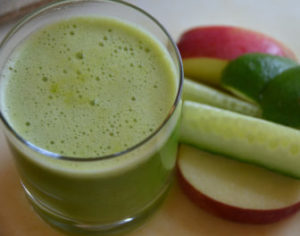Is juicing good for you?
 September 11, 2018
September 11, 2018
Table sugar, or sucrose, is made of glucose and fructose. The same glucose and fructose is also found in fruit, like apples. So why is table sugar so much worse for you?
It all comes down to how your body reacts to the sugar. Your body processes digestible carbs and absorbs sugar, which enters the blood. The pancreas dumps out insulin so that cells can absorb the sugar for energy. The glycemic index ranks carbs on a scale of 1-100 based on how long it takes your body to develop a blood sugar spike, and how intense that spike is. Why does this matter? Eating a lot of high-glycemic-index carbs can lead to an increased risk of chronic diseases, like obesity, diabetes, heart disease and even cancer. Processed junk foods tend to have a high glycemic index (think white rice, white bread, cakes, candy, cookies, soda).
But what happens when you take the sugar out of an apple and turn it into a juice? That turns a low-glycemic-index carb into a high-glycemic-index carb. When you strip away the fiber in an apple, which helps slow down the blood sugar spike, the body reacts more like it would to table sugar. Pure fruit juice is not healthy, but juicing can be good for you depending on what you juice. Try to make your juice with mostly vegetables and sweeten them with carrots, beets or lemon—or a very small amount of fruit if you need to.
A sample recipe:
1 cucumber
A few celery sticks
½ bell pepper
1 radish
2 cups spinach
2 carrots
2 lemons
Broccoli, cabbage, kale, swiss chard, kohlrabi and wheatgrass are also great juicing veggies.
